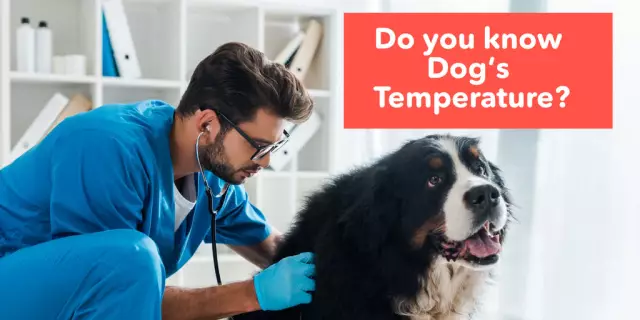- Author Delia Mathews [email protected].
- Public 2023-12-16 00:05.
- Last modified 2025-01-22 15:45.
An important indicator of a dog's health is its physiological state, namely body temperature. There are many factors that can change these indicators in one direction or another.

The body temperature of a dog depends on the sex of the animal, its breed, physical condition and other individual characteristics. It is important to measure the temperature of the dog in a normal state. Knowing the temperature of the animal can help identify health problems in the dog.

What is the normal body temperature?

Dog owners should be aware of the normal body temperature for dogs. In adult animals, the permissible temperature values are 37.5⁰C - 38.5⁰C. In puppies, an increase of up to 39 ° C is allowed. But this indicator is strictly individual and can change in the event of an animal's activity or an increased ambient temperature.

In large dogs, all metabolic processes in the body are slower than in small breeds, so their body temperature is lower.

Females may rise in bitches during heat and heat. Childbirth can also affect the change in body temperature in a dog. In this case, it may decrease.
How and when is the temperature measured?
Before giving a dog or puppy a vaccination, it is necessary to measure the temperature. To do this, you need to take an electronic or mercury thermometer. Using an electronic thermometer, you will shorten the time for measuring the temperature of the dog and determine the parameters more accurately.
It is better for large and aggressive dogs to muzzle first, as this procedure is considered unpleasant for the animal.
Temperature measurements can be taken with the animal on its side or while the dog is standing.
The cannula of the thermometer must be lubricated with any cream, then we move the tail to the side, and insert it 1-2 cm into the rectum. After measuring the temperature, the thermometer must be rinsed with warm water and disinfected with an alcohol solution.
An elevated temperature may indicate inflammatory processes in the body or the onset of an infectious disease. In this case, the dog can eat or refuse it.
Vaccinating your dog will prevent and protect your dog from getting dangerous infections that can be transmitted to humans. These infections include leptospirosis and rabies.
If the animal is trembling, it has diarrhea or vomiting, then these are clear signs of the disease, the pet must be shown to the veterinarian.






